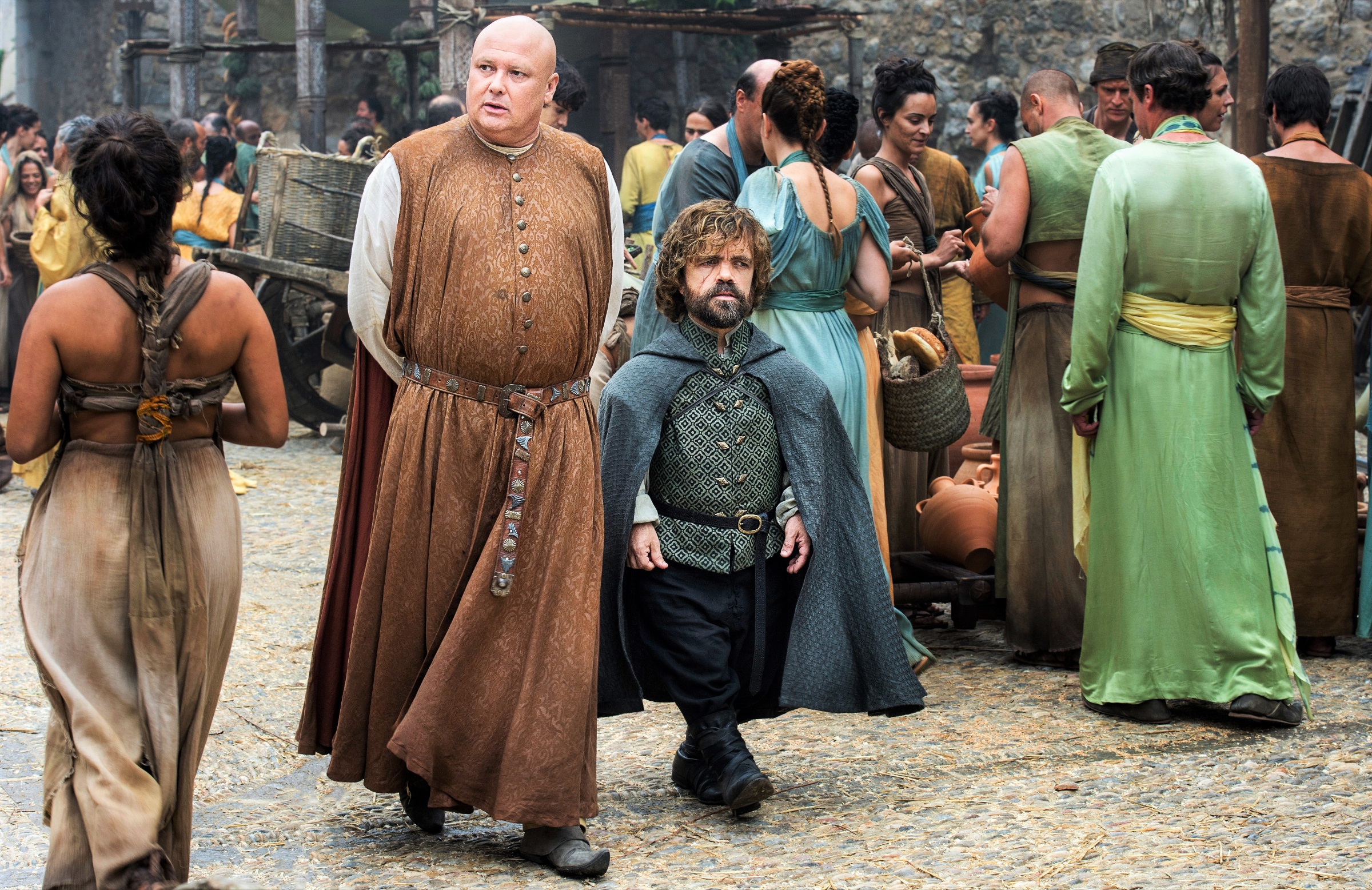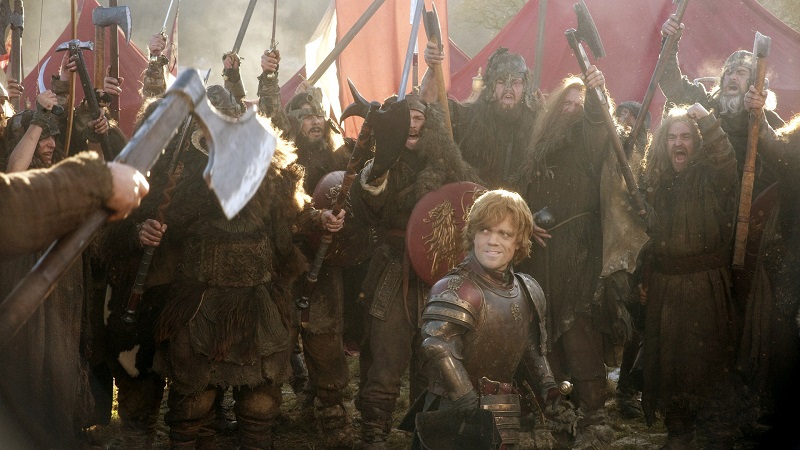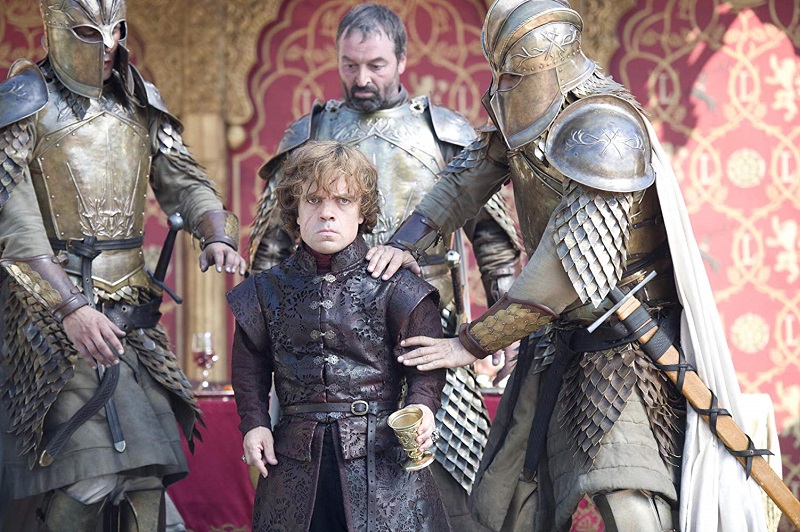“So power is a mummer’s trick?”
“A shadow on the wall,” Varys murmured, “yet shadows can kill. And ofttimes a very small man can cast a very large shadow.”
Tyrion smiled. “Lord Varys, I am growing strangely fond of you. I may kill you yet, but I think I’d feel sad about it.”
— A Clash of Kings, Tyrion II
In the second season of Game of Thrones, Lord Varys “the Spider” presented to Tyrion Lannister a parable on power. Varys described a scenario where a sellsword was commanded by three men – a septon, a king, and a man of great wealth – to slay the other two. The Spider’s example neatly represented three types of influence – spiritual, landed authority, and hard cash – but his list of petitioners for the sellsword could have included more. The sellsword could have also been commanded by his mother, his child, his best friend, the most beautiful woman in Westeros, etc. There are many possibilities that could have expanded the scenario.
But Varys, an accomplished mummer and showman, is employing the performance Rule of Threes. When setting something up, three items is enough to establish a non-coincidental pattern, and even though listing more than three could work, it’s not as concise or clever. It’s why comedy often works with three elements. “A northman, a dornishman, and a wildling walk into a bar…”
Narratively speaking, it’s instructive to look where a character has encountered two situations that imply a pattern, and consider that the Rule of Three could be in effect and another similar event is awaiting the character in the future. Like waiting for the other shoe to drop (if people had three legs.)
Tyrion Lannister’s story arc hasn’t been too compelling over the past several seasons. It can be argued that when Varys was lecturing Tyrion on power in the second season, the Lannister was enjoying the most amount of his personal agency on the show. It’s hoped that his role in Season Eight will turn up the narrative volume on some of the “oh yeah, Tyrion was there too” plotting for Tywin Lannister’s second son.
Looking at Tyrion’s storyline, there are three sets of paired events that might provide satisfying story elements in his final season, where a third element turns any of the established couplets into triplets. Significantly, Tyrion has been married twice, been personally involved (with a touch of betrayal) in two major battles, and has been put on trial twice for crimes he didn’t commit.
Tyrion: My life has been busy, yes. I get around.
WIVES
The books and the show have presented Tyrion’s second marriage to Sansa Stark, but both media also cover Tyrion Lannister’s first marriage. Tyrion confided that he’d been wed previously, a marriage that ended disastrously when diabolical dad Tywin Lannister discovered that his son had married beneath his station, and cruely punished Tyrion’s wife Tysha with a punitive gang-rape by the Lannister garrison.
Presumably, Tywin had the drunken septon who married Tyrion and Tysha officially annul the marriage (under threat if the septon did not) – although this would legally wash away the marriage as if it had never been, it set up a terrible wedge between the two Lannisters and was partly responsible for Tyrion stealthing into the Lord Hand’s chambers with murder on his mind. (Show watchers, you’ll have to trust me on this. Or read the books. Everyone should read the books to get a glimpse of characters’ internal unspoken motivations.)
Tywin’s forceful handling of Tyrion’s first marriage was echoed somewhat in reverse in Season Three, with Tywin forcing Tyrion to marry the captive and highborn Sansa Stark. In both cases, Tywin had little regard for his son’s wife. Tywin was insistent that Tyrion have sex with the child-bride immediately, to produce as soon as possible both an heir and a Lannister political lever that could be used with the North. This was an act that Tyrion steadfastly (if passive-aggressively) refused.
The lack of consummation of the marriage played into Lysa’s plans to annul Sansa’s marriage so she could marry her niece off to her son Robin, the sickly Lord Paramount of the Kingdom of Mountain and Vale. (And if we address the show’s storyline, the lack of consummation played into Roose Bolton marrying his son Ramsay to Sansa. But let’s not dwell on that.)
Since Tyrion has been married twice, once for love and once in a forced marriage for political gain, a reasonable speculation for Season Eight would be his getting married a third time. And for once, Tywin Lannister won’t be there to ruin it either way.
Tywin: Hmmm.
George RR Martin has said that he was inspired by the War of the Roses when he was envisioning A Song of Ice and Fire, and of course that doesn’t mean that the conflict between the Starks and the Lannisters will absolutely parallel the warfare and resolution between the Yorks and the Lancasters (who didn’t have either dragons or ice monsters to complicate their feuding) – but since a political marriage ended the War of the Roses with Henry Tudor marrying Princess Elizabeth of York, it’s possible that a political marriage will be a Westerosi social event in the final season.
Tyrion could just be remarried to Sansa Stark – the show has their marriage interupted, and even though the Bolton marriage isn’t canon in the books (I mean with Sansa) since Sansa was not married to Tyrion in accordance with the Old Gods traditions (the northerners want there to be a heart-tree on hand to witness the vows) – if a Stark/Lannister marriage is reasonable to bring a new peace in the realm, the bride and groom would have to get married again proper and northern.
But I’m not sure Sansa is interested in that specific deal.
Sansa: I’m going to marry someone taller. With a nose. I’m Queen in the North! I have some standards.
From a strictly political perspective, Tyrion marrying Yara Greyjoy also has merit. The Iron Islands and the Kingdom of the West traditionally have issues getting along, so whomever ends up on the Iron Throne might want to try and foster some conciliation between those two regions. Imagining Tyrion and Yara as a wedded couple is a bit head scratching, although it might work out as long as proper duty is done to obtain an heir, and neither complains about their spouse’s mistresses.
Tyrion: My radiant wife, I wanted you to know that I’m thinking of going riding with Lady Alys tomorrow.
Yara: Suit yourself, my beloved. I think I’ll take her sister sailing.
Tyrion: Nice!
But before we start checking out Tyrion’s wedding registry, we should consider another angle on a third marriage. It’s also reasonable for the Rule of Three to include a third element that gets subverted. Tyrion married Tysha for love (which was a disaster thanks to Tywin), and was forced into a loveless marriage for political gain (again, by Tywin.) Tyrion might pursue matrimony with someone that he loves, while touting its political sense. And having his proposal rejected significantly.
I’m not talking about him proposing to Arya Stark (even though GRRM’s initial pitch letter for the series included an abandoned love triangle between Tyrion, Arya, and Jon.) I’m talking about Tyrion making his case to marry Daenerys Targaryen.
There’s enough information from actor statements (and uncovered script clues) to conclude that Tyrion Lannister is in love with the Mother of Dragons. And Tyrion might consider that her taking on a consort with his bona fides – presumably the heir to Casterly Rock by virtue of elimination (depending on Jaime’s interest in the Rock and if Jaime survives the war) – would be a shrewd political move. Tywin Lannister also thought that he could secure the Lannister legacy by proposing marriage between Cersei and Prince Rhaegar Targaryen. King Aerys rebuffed the proposal, which created a wedge between the Lannisters and the Targaryens, which culminated in the sack of King’s Landing during Robert’s Rebellion.
Daenerys is likely to rebuff Tyrion’s advances, honestly.
Dany: I mean, I’ve seen Jon Snow in the buff.
Tyrion: I’ve heard that he might be your nephew. Gross.
Dany: Well I’ve read on Reddit that you might be my brother.
Jaime: It’s not as much of a problem as you might first imagine.
Cersei: It really depends on the brother.
Regretfully, Tyrion might not take the rejection well, and end up as disgruntled as Tywin was in regards to Aerys.
Tywin: I can find a way to ruin everything, even in death.
WARS
In Season Two, Tyrion (with Varys’s assistance) was responsible for preparing King’s Landing for the imminent assault of Baratheon forces trying to usurp the Throne.
Stannis: Renly was trying to usurp the Throne. I was expressing my legal claim.
Renly: I was going to usurp the hell out of that Throne. It would have been awesome!
Tyrion ended up leading a sortie against the Baratheon troops who survived his wildfire trick, rallying the demoralized defenders in the city with a rousing battle speech. He was nearly killed when a kingsguard assigned to protect him turned out to be an assassin.
This was the second major battle in Tyrion’s martial career.
In the season before Blackwater, Tyrion was forced by Tywin to command irregular soldiers made up of savage Mountains of the Moon clansman in the vanguard of Lannister troops. The Lannisters were trying to prevent Robb Stark’s northern army from crossing the Green Fork river.
The show opted to save on their budget by having Tyrion, the viewers’ Point-of-View for these events, knocked unconscious by accident after rallying his rough but ready clansmen with a pre-battle speech. “Halfman! Halfman!” the wildlings shouted, before rushing into battle and knocking Tyrion out in the process.
In the books, Tyrion rode into battle with ill-fitting armor, and managed to survive the melee, even capturing a northern knight for ransom.
The Battle of the Green Fork and the Battle of the Blackwater aren’t the only skirmishes Tyrion has been part of: he was nearly killed by clansmen when being escorted as a prisoner to the Eyrie by Catelyn Stark, and he’s been an observer at the Battle of Fire where Daenerys and her dragons lift the siege of Meereen to the dismay of the slavers, but Green Fork and Blackwater were major military actions that Tyrion was an active part of. And ones where allied forces intended him harm.
Tyrion suspected that Tywin deployed his son and the undisciplined troops among the vanguard at the Green Fork in the hopes that Tyrion would die in battle. Tyrion usually is correct on these assessments.
At Blackwater Bay, either Cersei or Joffrey commanded kingsguard Mandon Moore to try and kill Tyrion (let’s not debate who was responsible – either way, Tyrion was betrayed.)
Following the Rule of Three, Tyrion should be majorly involved in a third military engagement in Season Eight, and treachery should be at hand.
This isn’t too crazy speculation. It’s a given that a major battle will be taking place soon. Daenerys and Jon’s combined forces are heading to Winterfell (including Tyrion as Dany’s Hand) and the army of the dead is marching south. Presumably there will be a big battle in the North. But it is not very likely that Tyrion will be leading troops in this particular battle. At least not under the circumstances that will sync with the Green Fork and the Blackwater. Treachery shouldn’t be on the table, since the stakes are so high in the face of the White Walkers and their wights.
And I’m not sure the Northmen, Vale Knights, Unsullied, and Dothraki would need to follow Tyrion into battle. Tywin had his reasons to force Tyrion into command, and at King’s Landing Tyrion was forced to act in the face of Joffrey’s failure to lead.
But there’s opportunity for more involvement from Tyrion in a battle expected to take place after military action has concluded at Winterfell.
At the end of Season Seven, Cersei promised Lannister support for the Starks and Targaryens in the expected northern campaign against the army of the dead. In actuality, Cersei made these promises so the enemies at her doorstep would withdraw, and march into the north unsupported. Perhaps they’d defeat the army of the dead, perhaps they’d fall to the undead horrors. But Cersei optimistically assumed that once that battle was done, her forces – supplemented by the employment of Golden Company sellswords – would be able to deal with the victors.
One way or another, the scenario Cersei expects will probably happen, with hostile troops coming south.
Maybe at the Trident river (if the interpretation of the recent Game of Thrones animated teaser trailer is correct) or maybe at King’s Landing itself, there will be a battle which will include Lannister troops.
Cersei and Tyrion had an extended diplomatic meeting when negotiations briefly broke down at the Dragonpit, and part of the Lannister sibling’s discussion is unknown to the viewers. With Lannister troops in the mix, it’s more likely for Tyrion to be called on to lead in some capacity, fulfilling much of the requirements for a Rule of Three third battle. The missing element would be betrayal.
Cersei could certainly betray Tyrion again, but that would be a stale element at this juncture in the story. A more interesting betrayal, one that subverts what’s been done before somewhat, would be Tyrion betraying his allies.
I don’t mean Tyrion will betray humanity to the White Walkers. Nothing so crazy as that, but more in line with when he was targeted for assassination by the kingsguard. One of Tyrion’s rivals might be endangered by Tyrion’s actions on the battlefield. But who might that be?
Before that question gets addressed, consider the last candidate for a triple in Tyrion’s storyline: Tyrion on trial.
WITNESSES
Tyrion Lannister should consider having a lawyer on retainer, based on his tendency to be accused of crimes he didn’t commit. In the first season, Tyrion was arrested by Lady Catelyn Stark on suspicion of sending an assassin to kill her bed-ridden son Bran. Presented to Lysa Arryn at the Eyrie, Lysa opted to levy murder charges on Tyrion as well, accusing him of poisoning her husband Jon Arryn.
Tyrion: Next you’ll say I killed my mother. Wait. I guess I did do that.
Tyrion avoided judgment by Robin “Make Them Fly” Arryn by insisting on a Trial By Combat to establish his guilt or innocence. With the timely volunteering spirit of sellsword Bronn, Tyrion was exonerated from both the murder and attempted murder charges, and so left the Eyrie a free man.
He was a free man for a few seasons at least. In Season Four he was charged with murdering his nephew King Joffrey Baratheon with poisoned wine.
Facing a legally unfair court, as biased as Robin Arryn’s, Tyrion one again called on Trial By Combat to decide his fate. Lucking into the amazing champion Prince Oberyn “the Red Viper” Martell, the trial was nearly a repeat of the one in the Eyrie. But Oberyn’s overconfidence allowed Ser Gregor Clegane to unambiguously win the match.
By the laws of Westeros and the Faith of the Seven, Tyrion Lannister was found guilty of regicide and sentenced to death (or possibly bound for the Wall, if Tywin was to be believed.)
So twice Tyrion has been brought up on serious charges, twice he’s relied on Trial By Combat, but has gotten differing verdicts. First innocent, then guilty.
To satisfy the Rule of Three, Season Eight should feature Tyrion once again called up on charges. To mix things up, this time it should be for crimes that he did commit.
Tyrion is already on the hook for being convicted of killing Joffrey, but both Cersei and Jaime know about Lady Olenna’s confession that she was the one responsible for the poisoning.
Tyrion did murder his father Tywin. (It’s not likely that Tyrion would ever be punished or even called to account for Shae’s death, unfortunately.) Tyrion might have had legitimate grievances in regards to his father, but probably none that excuse murder under the laws of Westeros. The northerners would have had no love for Tywin, but after reading Fire and Blood and how Cregan Stark ruthlessly pursued the conspirators who murdered Aegon II, Tyrion’s patricide might bring him face to face with justice.
Or Tyrion might be in legal trouble for something else that will be addressed in the next section. Please, be patient!
Tyrion’s future trial might feature some procedural changes. Trial By Combat was outlawed by King Tommen, in response to counsel by the High Sparrow who questioned the accuracy and fairness of the process. (The High Sparrow’s substitute of a tribunal of seven septons might not have necessarily guaranteed a fair court, though.) It’s to be seen if this ruling will be respected or ignored.
Regardless, after being found innocent in one trial, and fleeing punishment after a guilty verdict in the second trial, a natural consequence of justice for the third trial would be guilt plus the acceptance of punishment. Tyrion might get a second opportunity to pee off the edge of the world at the Wall.
TYING UP THE THREE THREADS
There’s no guarantee that any of these things would come to pass. After all, the Rule of Three is just a good storytelling lever, but it’s not a requirement. Tyrion’s two weddings, two fraught-with-peril battles, and two trials might just be pairs of things, and not necessarily stepping stones to triplet plot points.
But they do feel like elements that might resurface in Season Eight for Tyrion’s storyline. Even if only some of them resurface, there would be a sense of tying a bow on a narrative thread.
But it’s possible that all three elements might come to pass, if some wild speculation can be indulged. Imagine the following:
- Tyrion pitches a marriage proposal to Daenerys, one which she rejects.
- Stung by jealousy, Tyrion blames Jon Snow, that good looking bastard.
- In the campaign against whomever (the White Walkers, Golden Company who are now following Euron, or some other unexpected military action,) Tyrion is in command of a group of troops, whom Tyrion deliberately withholds from assisting his romantic rival Jon Snow, hard pressed in battle.
- Jon Snow is hard to kill. And isn’t interested in forgiving Tyrion or listening to his excuses.
- Tyrion is put on trial.
- Drama ensues and there’s not a dry eye in my house.
When Varys posed his parable about power to Tyrion in Season Two, Tyrion was in-between weddings, battles, and trials. He was Hand of the King, defanging his political rivals in the city and exercising power. After his second battle which provided physical scars, his second humiliating wedding which provided emotional turmoil in regards to his relationship with Shae, and his second trial which took everything away from him – Tyrion’s position was dramatically reversed. Each of these events was a lever point in his narrative arcs, so future similar events would serve to shift Tyrion into the end game of his story.
Tyrion: These are all interesting thoughts, but let me offer a counterpoint. Assume that I am dramatically victorious in a major military battle, something I’m due for storywise. My heroism on the battlefield endears the heart of Daenerys Targaryen to me, and she amiably agrees to my well-reasoned political match. But Sansa Stark, equally moved by my feats of derring-do and my past kindnesses towards her, insists that I honor our previous marriage. I resign myself to marry them both.
Me: Uh, uniting the North, the Crown, and the Westerlands. Wow. But that’s just two out of three of the events.
Tyrion: As for the trial – don’t be so literal. I’ll engage in a witty debate with the new High Septon that I, Tyrion Lannister, should be allowed to have two wives, as Aegon the Conqueror did with Visenya and Rhaenys. My trial of wits and logic – not of combat – wins the day. Even Jon Snow and Ser Jorah Mormont approve, and agree to act as Best Men at my wedding. As an added bonus, Daario Naharis tries to abduct Daenerys during the wedding, but he is eaten by a dragon. Doesn’t this sound like a more satisfying ending to my narrative storyline?
Me: I don’t know what to say.
Tyrion: Obviously.
The post Tyrion’s Past, Tyrion’s Future: The Rule of Three appeared first on Watchers on the Wall.
Via http://watchersonthewall.com







No comments:
Post a Comment